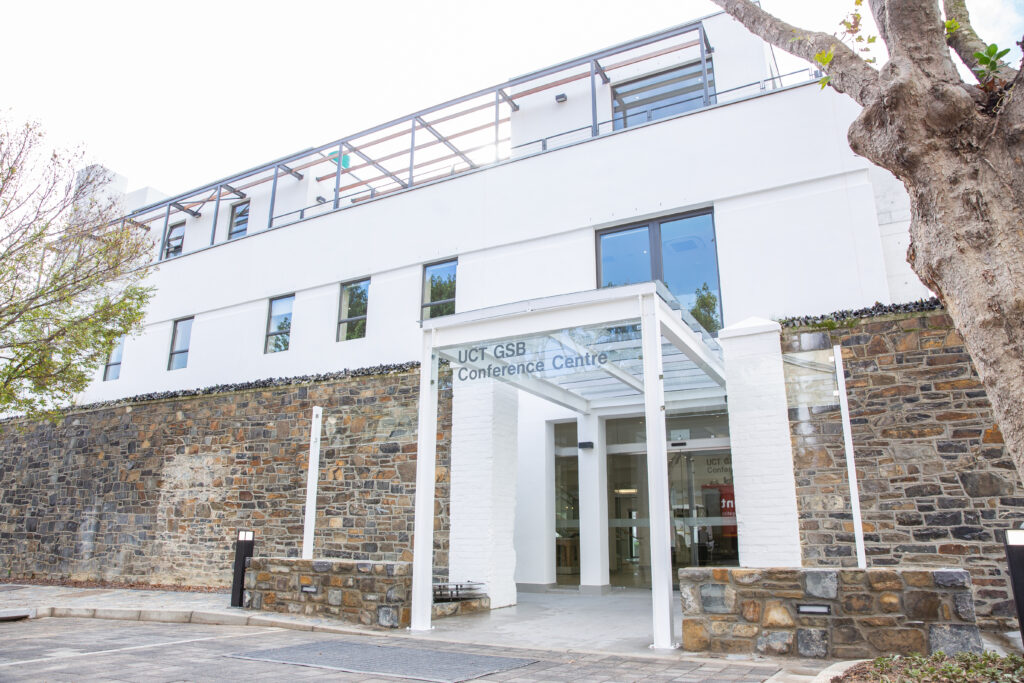Education needs to keep pace with a rapidly changing world. This has become a clichéd insight presented frequently in discussions about how education can solve existing problems by bridging gaps caused by new patterns of working and living. But it’s less often considered how technologies of today and tomorrow might themselves be problem solvers for situations that we’ve barely begun to consider.
Each year, a powerful panel of established business professionals from diverse industries gather at the Business Tomorrow conference run by the student-led Consulting Club at the UCT Graduate School of Business (GSB) to critically assess our rapidly changing environment, share experiences, and explore new possibilities. In this way, they can do their bit to predict the future, and get to work solving its problems long before they arise. For the students of the UCT GSB, it’s a valuable opportunity to engage with a variety of leading professionals in the consulting industry — those already doing the work for which the students are being prepared.
The Business Tomorrow conference is one of several strategic platforms and engagement sessions initiated by the UCT GSB’s Careers and Corporate Partnerships office. Others, such as the annual Women in Business conference and the Future of Work fair expose MBA students to industry leaders and important conversations about the world of work, such as post-Covid-19 recovery workforce strategies, with high-profile companies such as the Johannesburg Stock Exchange, Deloitte, Maersk and Mercer, to name a few. MBA internships, business projects, mentorship engagements, industry networking opportunities and other practical interventions in the job search process are just some offerings of the UCT GSB’s Career Services department. “Our aim is to build talent that is capable of mastering change and adapting to the future world of work, while instilling an attitude of lifelong learning,” says UCT GSB’s Corporate Partnerships Manager, Azvir Rampursad.
In creating business education that serves the modern professional, all manner of the New Normal must of course be considered. From managing a team remotely to handling the intricacies of collaboration within an organisation that seldom if ever meets, business education from short courses to the MBA are adapting to enable students to rise to the challenges of a post-Covid-19 workplace — or the lack thereof.

First-hand experience of the future
For Associate Professor Hamieda Parker, future-looking education means using Experiential Learning Methods while teaching Operations and Supply Chain Management. In this way, she can equip students to use Operations Tools, whenever needed, even in a crisis.
Using simulation and games to teach and practise skills allows students to gain expertise in situations that are rare, dangerous and often daunting. The first benefit of this is a hands-on learning experience in which tools are accessible immediately, not hidden in a theory book. The second is the ability to gain the confidence and precision that can only come with practice. When teaching highly specialised skills, one can hardly hope for an opportunity to arise in which to practise them. But arriving at a real-world situation in which the specialised skills are needed without the confidence that practice provides is perhaps even more alarming.
Recently, South Africa witnessed cutting-edge expertise come to the aid of students who were facing time-worn problems — one of them decidedly ancient. Following the recent Cape Town fires that swept the city’s mountain and landmarks, some of the devastation was mitigated thanks to the skills of professionals who’d been learning to apply their newly acquired abilities in the most practical of manners.
Following the Gift of the Givers’ impressive hunger relief efforts during South Africa’s lockdown, it’s become a common refrain on Twitter, only half-jokingly, that the organisation should simply be handed all of the country’s most important tasks, from vaccine distribution to governance. Even with their reputation for efficiency preceding them, Gift of the Givers delivered a disaster response that was astoundingly speedy in the wake of the Cape Town fires. Some of that efficiency can be attributed to the practical training that Zameer Brey received during his MBA, and which as a volunteer he skillfully applied in setting up a meal packaging and distribution system for the affected students.
UCT GSB finance manager Karo Wilson and Kumeshnee West, the director of Executive Education, meanwhile, set up the UCT GSB systems to support students during the fire. When the scale of the damage and resulting need became apparent, they were able to immediately apply and implement what they’d learnt during their MBA studies in a real-world crisis situation. The MBA alumni quickly got to work convening the logistics of a massive operation to ensure that the donations pouring in from corporations, organisations and individuals were put to good use — expediently, and without waste.
The UCT GSB Academic Conference Centre became a donation station; more than 100 volunteers assisted throughout the week with sorting, packing and distributing essentials to students. Its success is testament to the success of the teaching methods employed at the UCT GSB.
Past, unprecedented, and future
A catchphrase of the pandemic is “unprecedented times”, and fittingly, a part of our new normal is realising the necessity of expecting the unexpected. But as scientists and medical professionals are quick to point out, the Covid-19 pandemic may have been unprecedented in scale, but it wasn’t without precursors. Learnings from other outbreaks and epidemics were what stood some countries in good stead while others squandered their chances at shoring up resources and taking useful precautions.
It’s this combined knowledge — that we’ll always face novel challenges, but that our experience from similar scenarios will see us through — that informs a truly proactive approach and teaches students to take on high-stakes situations. Practice may not always make perfect, but it can help us prepare.
For more details, visit www.gsb.uct.ac.za